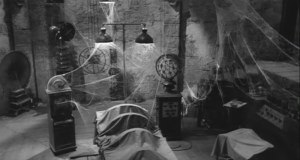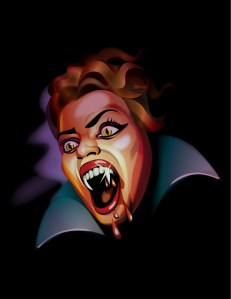P.H. Solomon's Blog, page 326
October 16, 2014
Writing secret: all you need is CURIOSITY and SURPRISE
 PHS:
PHS:
I’ve seen that whale clip before and it’s great. Thanks for an enlightening post – re-blogging on Archer’s Aim.
 Originally posted on The Red Pen of Doom:
Originally posted on The Red Pen of Doom:
Whether you write novellas about fierce mermaids, magazine stories for Cosmo (insert your own joke here) or speeches about the Austrian school of economics for the IMF — whatever sort of writer you are, two things matter most.
Not correct grammar and spelling. Those things are assumed.
Not pretty paragraphs and sentences that sing. That’s word gravy, while we’re talking about the main course.
What matters most: making your readers curious, then surprising them.

Surprise Kitteh is surprised.
This is why the inverted pyramid is a terrible structure for any writer. (Click with your mousity mouse to read Why the Inverted Pyramid must DIE.)
The inverted pyramid grabs a heavy rock and smashes the skull of curiosity. Then it takes that same bloody rock and crushes all hope for any surprises.
How does it achieve this epic level of failure? By giving you the answers before you even know…
View original 754 more words
Filed under: Uncategorized








Ye Olde Monster Lab
 PHS:
PHS:
It’s all fun & games until… Re-blogged on Archer’s Aim
 Originally posted on Legends of Windemere:
Originally posted on Legends of Windemere:

Young Frankenstein Lab
Welcome to . . . please don’t touch the cobwebs. We spent a lot of time getting those to look just right and we have enough trouble with the spiders trying to fix them. Those poison-spewing bastards think they own the place. That reminds me. Wear this mask to protect yourself or sign this ‘In Case of Eye Loss’ form. We may be mad scientists here, but we take liability very seriously. So, what can I do for you?
This facility can build you any monster you want. We have Kaiju-sized, tank-sized, human-sized, and . . . we have small ones too. To be honest, we don’t get many requests for tiny creatures. Everyone wants the big or human creatures. I’ll have to dust off the old book and special order the parts. Now pricing will be an issue right away. You can’t have a single mini-monster…
View original 383 more words
Filed under: Uncategorized








Beep! Beep! Is Your Writing Backing Up?

Photo via morgueFile.com
License Info: http://www.morguefile.com/license/morguefile
BEEP! BEEP! BEEP! You sense it almost like hearing the back-up warning on a big truck. There’s something off with your approach to writing but you can’t find the source. Here are 5 reasons your writing may be backing up on your readers:
1. Why your writing could be backing up. K. M. Weiland wrote an excellent blog that addresses writing sentences correctly but also incorrectly. Mainly, this discusses where you are pointing the reader with “grammatically correct” sentences. You may be technically correct but cueing the reader with the wrong emphasis.
2. You need to get linear. If you are using a lot of complex sentences your writing be out of logical sequence. What is non-linear writing? This occurs when a sentence has words like, “when”, “as”, etc. There are often multiple actions occurring in the sentence such as this but everything is out of order. Try using MRU’s – short for motivation-reaction units where a clear, external, motivational action occurs and then internal reaction.
3. Passive Voice. Avoid using so many helping verbs except in dialogue. Or, you can try using a deeper POV – recommended reading: Rivet Your Readers With Deep Point of View.
4. Reliance on too many modifiers. Check your adjectives and adverbs. Is the adverb you’re using actually necessary. If you are using several adjectives at a time trying choosing the strongest one and make sure it’s not redundant. Check this post for the link to using adverbs well.

Clip Art Image Copyright by Microsoft. Clip Art Used by Permission of Microsoft
5. Prepositional phrases that tell. Remove prepositional phrases that tell. The Rivet Your Readers book mentioned above has a great list of these. Why avoid such phrases as, “in dismay”? This tells the reader the emotion instead of showing them. This does not mean get rid of all prepositional phrases, just the ones similar to the example.
Remember: go forward rather than letting your writing back up.
Are you writing sentences out of order? Are you pointing your readers to the wrong place with incorrect emphasis? Where can you improve your writing for more reader engagement? I’d love to hear from you so won’t you leave a question, idea or strategy in the comment section? I’d also love to connect with you over social media so check my contact page for that information. See the News page for announcements and remember to sign-up to receive news and posts by email. I’ve added a new sign-up tab on my FaceBook page to simplify the process. New followers can download The Black Bag via free coupon today!
Follow Blog via Email
Enter your email address to follow this blog and receive notifications of new posts by email.
Photo via morgueFile.com
[contact-form]
Filed under: Blogging, Creativity, Editing, Fiction, Indie Publishing, Self-publishing, Social Media, The Black Bag, Tips, Twitter, Writing Tagged: creativity, Indie Publishing, P. H. Solomon, Social Media, The Black Bag, Tips, Twitter, writing








October 15, 2014
How to create a well-rounded, believable character: Guest Blog by L.A. Starkey
 PHS:
PHS:
Who’s that? A great guide to building characters. Re-blogging on Archer’s Aim
 Originally posted on Tea Talks:
Originally posted on Tea Talks:
I think for me, as a reader, the necessity of having well-rounded believable characters that capture my heart, my attention, or my hormones is vital. Reading a book where you just don’t like the main character is honestly painful and not something I can hang with for too terribly long.
One of the best tools I’ve found in creating a good character is to sketch him or her out from the beginning. Let me give you an example from my own debut novel, Deceived.
Name: Samantha Parker
Age: 17
Appearance: Deep blue eyes, black shoulder length-hair (straight), around 5’8’’. Athletic build with curves where needed, but not overtly feminine. No physical markings on her body other than the infinity symbol she receives throughout the book.
Personality: Sam has a sardonic sense of humor and keeps a pretty negative outlook on things. She allows very few people to get close to…
View original 496 more words
Filed under: Uncategorized








The Breaking of Genre
 PHS:
PHS:
These thoughts run parallel to my own post today regarding contrarian writing ideas. Re-blogging on Archer’s Aim
 Originally posted on William Drayman:
Originally posted on William Drayman:
I’ve enjoyed a few posts that have been written lately about the changing landscape of the publishing industry and, as I’ve commented before, the parallels with the shift in the music scene.
It’s amusing to recall one thing that stood out to me with the music industry that would appear to be inevitable for the writing world, too.
The divergence of genre.
As the corporate world lost its grip on the music industry, artists began to shake off the shackles of rigid genre bracketing that had always been a thorn in the side of most musicians.
With the demographic pop listener age continuing to slide towards a younger and younger audience as the corporations search for people unimaginative enough to buy their wares, the population of the listening audience grows ever larger for the so-called ‘Indie’ scene.
As I continue to argue, the boundaries between Indie and mainstream are blurring…
View original 578 more words
Filed under: Uncategorized








Against the Current: Contrarian Writing
 Most current blogs, teachers, writing coaches, editors, etc. steer newbie writers from using some forms of writing. However, it may not be the worst thing in the world to use these. Here are some recent contrarian writing ideas:
Most current blogs, teachers, writing coaches, editors, etc. steer newbie writers from using some forms of writing. However, it may not be the worst thing in the world to use these. Here are some recent contrarian writing ideas:
Expository writing: it’s especially discouraged as an opening to a novel but this article discusses how to pull it off. It’s a matter of being vivid, salting in some insights and showing a compelling background. Check out the quest post written by Jack Smith on Elizabeth S. Craig’s site (while you’re at it, like Elizabeth on Twitter - she posts a lot of great links).
 Stay away from those adverbs -they bite! Or not -check out how to season your writing with adverbs. It’s complete with some insightful examples. This post on Writers on the Storm by Laura Drake is really, really good so catch up with her on Twitter
Stay away from those adverbs -they bite! Or not -check out how to season your writing with adverbs. It’s complete with some insightful examples. This post on Writers on the Storm by Laura Drake is really, really good so catch up with her on TwitterNO PASSIVE ZONE! Really? An article from Ragan’s PR Daily shines some science on the usage as well as some consideration of why great writers used it well in the past. So all that passive voice you want to use is natural – just use it well.
So we might conclude that using these techniques are NOT impossible but, rather, require the use of skill. Again, writing rules are meant to be broken when applied properly. Read these, use them well but tread carefully.
What are your thoughts about writing advice? Have you successfully used these or other discourage techniques? Do you stay away from them as a rule? I’d love to hear from you so please leave a question, idea or strategy in the comment section. I’d also love to connect with you over social media so check my contact page for that information. See the News page for announcements and remember to sign-up to receive news and posts by email. I’ve added a new sign-up tab on my FaceBook page to simplify the process. New followers can download The Black Bag via free coupon today!Thanks for visiting!PHS
Follow Blog via Email
Enter your email address to follow this blog and receive notifications of new posts by email.
Coach Clip Art Image Copyright by Microsoft. Clip Art
Vampire Image via provided by NVTOfficeClips
[contact-form]
Filed under: Blogging, Creativity, Editing, Fiction, Indie Publishing, Self-publishing, Social Media, The Black Bag, Tips, Twitter, Writing Tagged: creativity, Facebook, Indie Publishing, P. H. Solomon, Social Media, The Black Bag, Tips, Twitter, writing








October 14, 2014
How to price your Indie book
 PHS:
PHS:
Clear ideas on Indie Book pricing – re-blogging on Archer’s Aim
 Originally posted on Nicholas C. Rossis:
Originally posted on Nicholas C. Rossis:
Guy Kawasaki, well-known author of APE: Author, Publisher, Entrepreneur – How to Publish a Book, has written a bullet-list article on how to price your book. Bottom line? It depends on the book, so it’s pretty much a case of trial and error for each author. Fortunately, as a self-publisher, you can test and change your decision if it’s not working.
So, what variables are there to take into account?
PRICING VARIABLES
There are five major variables that affect the price of your book:
1. Costs
There are two kinds of costs: preparation and production.
Preparation costs include such processes as design, editing, and layout. You might pay them only once, but nonetheless, you need to recoup them.
Production costs refer to how much it costs to make copies. If you’re publishing only an ebook, the cost per unit is almost zero. If you’re printing your book, you’ll incur…
View original 529 more words
Filed under: Uncategorized








4 Novel Writing Problems and Their Solutions.
 PHS:
PHS:
I like to see some problem solving. Re-blogging on Archer’s Aim.
 Originally posted on Dee Dee Chainey Writer & Illustrator:
Originally posted on Dee Dee Chainey Writer & Illustrator:
I know a lot of writers are great at the writing aspect of their jobs. Manyhave read a myriad of books, articles and blog posts with advice on how to write their novel: planning their plot, constructing their characters, working with tone and voice, and so on. Many have honed their craft to a fine art. They then go on to take this further with their marketing strategies, again researched until their fingers bleed and eyes weep. What I’ve noticed though, is that I speak to a lot of writers who continually bemoan the piles of paper on their desks, the labyrinth on files on their laptops and even worse, the overused scroll function within their Word document, which does in fact contain THE WHOLE of their manuscript in one long arduous page-after-page tirade.
Now, being overly organised to the point of friends once pointing out that if I had…
View original 1,659 more words
Filed under: Uncategorized








Blogging Outside Your Normal Schedule Pt. 2
 Last week I enacted a strategy to improve my website analytics over the weekend which can be seen in my former post.. The results were very good so I continued testing my strategy this week.
Last week I enacted a strategy to improve my website analytics over the weekend which can be seen in my former post.. The results were very good so I continued testing my strategy this week.
I’ve added a few tweaks:
I started using extra hashtags including #WordPress for the tweet from Publicize.
I tweeted and posted on Facebook more during the weekend over two weeks ago so that my average engagement was much higher during the week.
I’m posting an older blog on Saturday and a newer one on Sunday.
Here are the results for this week:
Saturday, 10/11/14: The strategy continued working well with 27% more visitors over last week and by 8.5 times on 9/27. Interestingly, due to a lack of time, my Twitter engagement was down somewhat but the strategy still worked with targeted efforts.
Sunday, 10/12/14: Visitor stats increased by 35% over 10/5 and was over 6.5 times greater than on 9/28. Again, due to my schedule on this day my Twitter engagement was half what it was on Friday, 10/10 but didn’t affect the outcome. Again, targeted effort was just as effective.
These results continue to prove my strategy useful for now. It also continues to improve my weekend Twitter engagement.
Next week I will report once more on this little project as well as any changes or additions I make to the strategy.
 Have you developed a strategy for your unscheduled blogging days? If so, please share your thoughts in the comments section. I’d also love to connect with you over social media so check my contact page for that information. See the News page for announcements and remember to sign-up to receive news and posts by email. I’ve added a new sign-up tab on my FaceBook page to simplify the process. New followers can download The Black Bag via free coupon today!
Have you developed a strategy for your unscheduled blogging days? If so, please share your thoughts in the comments section. I’d also love to connect with you over social media so check my contact page for that information. See the News page for announcements and remember to sign-up to receive news and posts by email. I’ve added a new sign-up tab on my FaceBook page to simplify the process. New followers can download The Black Bag via free coupon today!
Follow Blog via Email
Enter your email address to follow this blog and receive notifications of new posts by email.
Chess pieces on chessboard — Image by © Royalty-Free/Corbis
Clip Art Image Copyright by Microsoft. Clip Art
[contact-form]
Filed under: Blogging, Creativity, Fiction, Indie Publishing, Marketing, Planning, Self-publishing, Social Media, Tech Tips, The Black Bag, Tips, Twitter, Writing Tagged: creativity, Facebook, Indie Publishing, Marketing, P. H. Solomon, Planning, Social Media, The Black Bag, Tips, Twitter, writing








October 13, 2014
Creating an Ironic Tone in Your Fiction
 PHS:
PHS:
I like these insights on creating tone in writing – specifically irony. Re-blogging on Archer’s Aim
 Originally posted on jacksmithwriter:
Originally posted on jacksmithwriter:
First off, what is tone? On the one hand, we might say that it’s the apparent attitude of the narrator toward the characters and the world they people. But it should also be said that everything in a fictional work relates in some way to the tone. If every character in your story drives crazily and exceeds the speed limit, this will certainly affect the tone. If all the clocks are off twenty minutes, this will too.
To create the right tone, you need to attend carefully to narrative style, plus you need to think about character actions, dialogue, and setting. All of these will affect the tone of your story or novel.
Being something of an iconoclast, I tend to go for irony. And ironic tone is, of course, the right tone for satire—which is my usual medium.
And…
View original 331 more words
Filed under: Uncategorized











